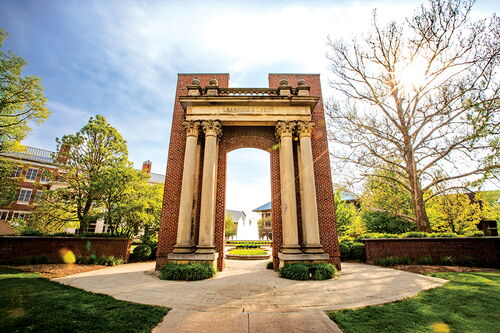The chemistry for success
Fortune magazine described Richard Heckert (AM, '47; PhD, '49, chemistry) in 1987 as "gregarious, relaxed and unflappable….a 6-foot-3, friendly bear of a boss." With his people-person skills, plus an understanding of the power of market-oriented research and manufacturing, Heckert had worked his way by then to the pinnacle of the business world.
Heckert spent his entire career at DuPont, eventually becoming CEO of this large, diversified company, which is perhaps best known for synthetic polymers and products such as Neoprene, Nylon, Dacron, Teflon and Kevlar. Along the way, Heckert has collected numerous honors, the latest being the 2004 Alumni Achievement Award from the College of LAS.
During World War II, Heckert worked on the top-secret Manhattan Project, in which his team recovered valuable enriched uranium from work areas, extracting it from equipment, floors and even uniforms. Then, after obtaining his PhD in organic chemistry from the University of Illinois in 1949, he started in basic research at DuPont.
But as he put it, "I knew I wasn't going to stay in research the rest of my life. Manufacturing and marketing had considerable appeal and provided more opportunity to work with those in different disciplines."
His affinity for other aspects of the business took him up through the ranks in research and manufacturing, where he learned key lessons—with one of the biggest lessons coming early in his career as manager of the DuPont Mylar plant in Circleville, Ohio.
"When I took over, I thought I was doing and saying all of the right things about safety," Heckert recalled. "But in my first three or four months, we had two major injuries."
Heckert realized he had to communicate more clearly with the plant's 500-plus employees, most of whom he knew by name. So he arranged meetings with groups of 30 and laid down the rules, telling them, among other things, "I'd rather send you home fired than send you home in a box."
The message sank in and the plant went many years without a major injury. Heckert remained a stickler for safety throughout his career, as he worked his way up to a vice president position by 1973 and CEO in the 1980s.
Heckert brought with him a customer-centered approach, which was critical in the increasingly competitive environment of the 1980s. When he started his career in 1949, DuPont was the only chemical company with the resources and organization to handle the work it was doing. But by the 80s, competition was fierce, so Heckert and his associates boosted DuPont's marketing efforts, reorganized its electronics, imaging and medical products ventures, and consolidated its automotive products operations to better serve customers.
Heckert also worked with Congress to produce toxic substances legislation that successfully protected people without shutting down businesses. In addition, he was appointed to President Carter's Trade Advisory Committee and was active on the boards of many influential organizations. He chaired the boards of the Carnegie Institution of Washington and the Joint Council on Economic Education in New York, which helps K-12 schools teach the fundamentals of economics "so that kids don't graduate economically illiterate," he said.
Through it all, commitment and perseverance were the keys, Heckert noted— lessons he learned from many sources, including his high school football coach, the legendary Weeb Ewbank (who went on to lead both the Baltimore Colts and New York Jets to championships).
As Heckert put it, "I had reasonably high expectations for myself and my team at DuPont. That's essential to success."








